FACULTY HIGHLIGHT: Theodora Dragostinova
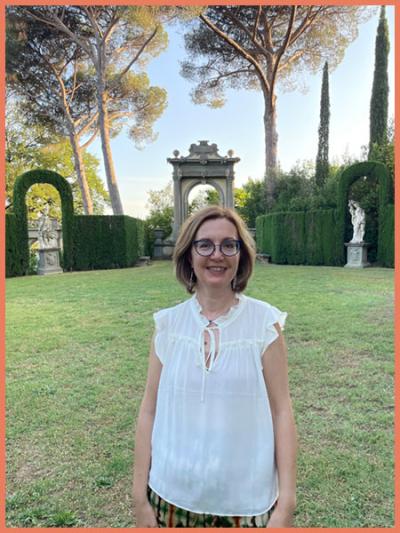
THEODORA DRAGOSTINOVA HAS BEEN TEACHING at Ohio State since 2007. A native of Bulgaria, she received a degree in history and archaeology from the University of Athens, Greece before completing a PhD in history at University of Illinois at Urbana-Champaign.
Professor Dragostinova is the author of two award-winning books and co-editor of two volumes. A specialist on eastern Europe, she writes about nationalism, war, minorities, refugees, communism, and the Cold War in the Balkans and beyond. Currently, she is starting a new project of the repatriation of children in the post-1918 Balkans. Titled Spoils of War, this book reconstructs the tortuous paths of young people caught in war in today’s Bulgaria, Greece, Serbia, North Macedonia, and Turkey. This research is partially inspired by Russia’s war of aggression on Ukraine and the International Criminal Court’s indictment of its leader for war crimes connected to the deportation of Ukrainian children to Russia.
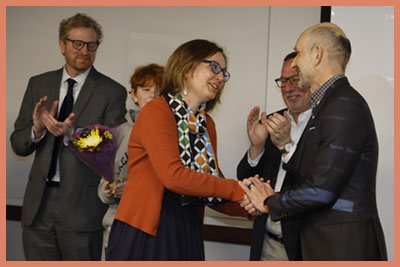
Dragostinova teaches broadly, from seminars on global mobility or comparative nationalism to lecture classes on Society and War in Eastern Europe or Europe Since 1950: From the Iron Curtain to Fortress Europe. Keenly interested in migration, she participated in the team that created a new GE Theme on Migration, Mobility, and Immobility. In 2023, she received the Distinguished Alumni Teaching Award because of her wide-ranging teaching and innovative pedagogical practices, such as bringing noted public speakers to interact with her students. This academic year, she taught a new class, Europe Since 1989: Multiple Europes after the Cold War. A part of the “generation of democracy” in 1989 Eastern Europe, she wanted to explore the end of the Cold War as a historical process. ■
Written by Theodora Dragostinova, Professor of History
FACULTY HIGHLIGHT: Robin Judd
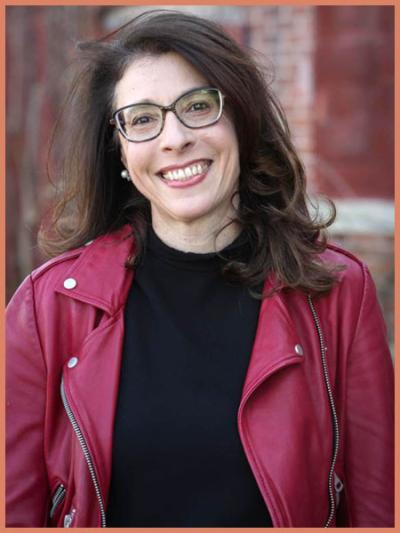
SERVICE IS A SIGNIFICANT PART of Professor Robin Judd’s life. Judd is President of the Association for Jewish Studies (AJS), the largest international learned society for scholars of Jewish Studies, and Vice Chair of the Faculty Advisory Board for the Leo Baeck Institute, an archive and research library devoted to the history and culture of German-speaking Jews. She also serves on Ohio’s Commission for Holocaust and Genocide Education and Memorialization, directs the Department’s Hoffman Leaders and Leadership in History program, and participates in STEP, the Sophomore Transformational Experience Program. During 2022-2023, Judd helped launch several important initiatives as AJS President, including a Scholars of Color Mentoring program and a rethinking of the association’s development strategy; as part of a commission subcommittee, she worked to conceptualize and run a grant program for state agencies and organizations. “One of the things that I most enjoy about being at OSU,” writes Judd, “is its expectation and embrace of service.”
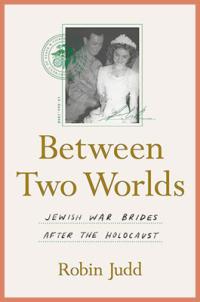
Professor Judd recently completed Between Two Worlds: Jewish War Brides After the Holocaust (UNC Press, December 2023). Her book studies the European and North African Jewish survivors who married members of the American, British, and Canadian armed forces between 1944 and 1950. Judd describes the book as “a labor of love.” Based on a wide array of archival sources as well as personal interviews, the book offers a previously untold story about the Holocaust and the postwar period. ■
Written by Robin Judd, Associate Professor of History
“Historians make the best futurists,” says David Staley
SINCE 2015, Associate Professor of History David Staley has been writing a monthly futures column called “NEXT” for Columbus Underground, a local online news publication.

He writes on a range of topics: the future of money, the future directions of the global economy, the future of artificial intelligence, the future of climate change, the future of biotechnology, and the future of our aging society, among many other topics. For his April 2023 column, for example, he conducted an interview with ChatGPT, to explore what the large language model (LLM) was both capable and incapable of accomplishing. “My conversation suggests,” says Staley, “that ChatGPT is both a huge deal, and not that big of a deal at the same time.” For his NEXT column, in 2022 he was awarded “Best Freelance Writer” by the Ohio Society of Professional Journalists. “NEXT” is an example of Staley’s commitment to public-facing scholarship. He is frequently invited to be a keynoter at both academic and professional conferences on the topic of the future; to take one example, Staley presented “Imagining the Future: Thriving in a Time of Perpendicular Change” at the Cleveland Federal Reserve Bank of Cleveland.
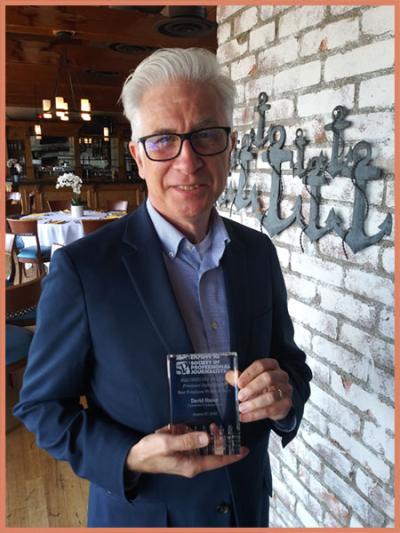
In November 2022, the Center for Science and the Imagination at Arizona State University - where Staley has been an external fellow since 2021 - published an edited collection of these columns under the title Visionary Histories (available at: csi.asu.edu/books/visionary-histories/). “When someone says they want to know the future of something,” says Staley, “what they are really saying is they want to know what the state or behavior - especially the emergent behaviors - of some complex adaptive system is going to be at point n in the future. Visionary Histories makes the case for the disciplined study of the future via the historical method, that historians are methodologically well-positioned to anticipate the possible future behaviors of a wide variety of complex systems.”
Indeed, in his scholarship, Staley makes the case that history might be conceptualized as that discipline that studies the past behavior of complex systems. A complex system is made up of a set of agents in dynamic interaction with each other. Because of the complex feedback between these agents, the overall behavior of the system cannot be determined by simply adding up the individual behaviors of the agents. Unexpected behaviors often emerge from these complex systems, a phenomenon called “emergence.” Complex systems are sensitive to initial conditions, meaning that by changing the original context under which a system is operating - even by just a little - the system could exhibit wildly divergent behavior. This kind of behavior is identified by scientists as “non-linear,” meaning that even a small change can have massively outsized effects on the behavior of the system as a whole. An example of this non-linear behavior is the Butterfly Effect, where a butterfly flapping its wings in West Africa disturbs the air around it, cascading throughout the atmosphere such that it produces a hurricane over the Atlantic. Because of sensitivity to initial conditions, feedback, emergence and nonlinearity, prediction of the behavior of complex systems is often not possible. While different possible future paths might be identified, the precise direction of change to the system cannot be determined with certainty.
The study of complex systems is usually undertaken by scientists: Staley believes that historians also study the behavior of complex systems, minus the formal mathematics. One way of thinking about the study of history is to see it as the analysis and narration of numerous instances of non-linear behaviors arising from complex systems. To take but one example, the European Alliance system before 1914 could be described as “agents in dynamic interaction with each other,” in other words, a complex system. One small event - the assassination of Archduke Franz Ferdinand - cascaded into an unanticipated four-year long world war that killed millions. Most of what historians study, Staley contends, are the past behaviors and trajectories of complex systems.
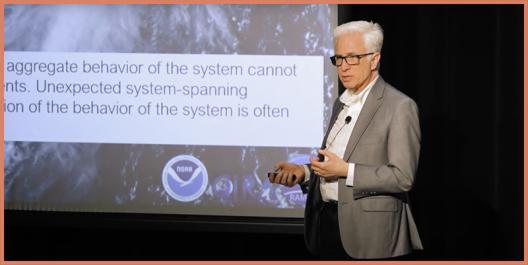
Thus, given that the future will be defined by the behaviors of complex systems, Staley believes that historians make particular good futurists: we can anticipate the possible future behavior of a number of complex dynamic systems. Staley made this argument in February 2023 when he delivered a talk at the College of Arts and Science’s “Science Sunday” public lecture series (available at: go.osu.edu/StaleyScienceSunday).
Two of his most recent books use this form of history-as-foresight: Alternative Universities: Speculative Design for Innovation in Higher Education (Johns Hopkins University Press, 2019) and his most recent book (co-authored with Dominic D.J. Endicott), Knowledge Towns: Colleges and Universities as Talent Magnets (Johns Hopkins University Press, 2023), both of which are example of strategic foresight for colleges and universities.
“Although we are loath to admit it, historians really do make the best futurists,” says Staley. ■
Written by David Staley, Associate Professor of History
On the Trail of Medicine Ships
SUNKEN CARGO FROM ancient shipwrecks gradually becomes host to a great variety of marine life after centuries spent underwater. Ceramic jars and vessels crusted over with shells and concretions today once held important organic goods that helped to shape global trade routes. Research by Amanda Respess, Assistant Professor of Premodern World History at The Ohio State University at Marion, is focused on unpacking the hidden commodities that were once loaded tightly inside shipwrecked storage jars and shipping containers from the Maritime Silk Road. Her research follows the trail of evidence left on the seafloor and recaptures traces of the lives of the merchants who moved these materials across the sea. Her current book project examines a transregional archive of wrecked ships from the eighth through sixteenth centuries, following the wake of Persian Gulf merchants who shipped medicines and spices across the Indian Ocean.
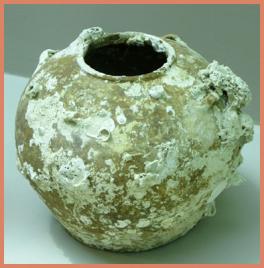
The Maritime Silk Road was a bustling network of sea routes latticing the Indian Ocean that connected the shores of East Africa with the Arabian peninsula, Persian Gulf coast, South and Southeast Asia, and China many centuries before the European colonial spice trade began to reshape global commerce and power. The material evidence of the movement of spices and medicines along these routes in premodern history reveals the shape of the world before that transition and demonstrates the extraordinary nature of long-distance connections in the era before modern globalization. Respess’ current project examines the dynamic Indian Ocean trade through the lens of medical history, carefully following the movement of ideas alongside the transit of medical materials and remedies that would come to populate medicine cabinets around the world.
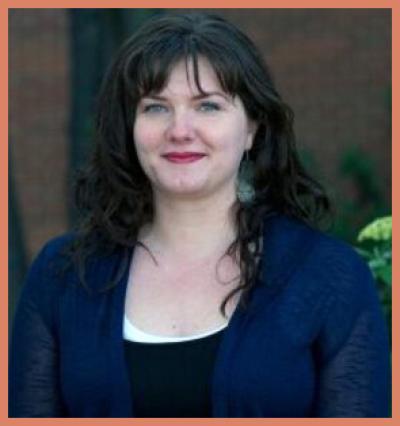
Respess’ research follows the evidence of maritime trade to the communities of drug and spice merchants from the Persian Gulf that eventually settled in the port cities of China and Southeast Asia. In the eastern Indian Ocean world, these merchants would participate in the events of their newfound homes and influence medical practice and commerce, leaving both textual records and archaeological ruins behind. Persian Gulf drug merchants would play an important role in spreading Islam to China and Southeast Asia and her book looks to port city inscriptions and architecture within the broader context of concurrent political and cultural developments in the Islamic world. Chinese port cities, in particular, are highlighted as sites of exchange, abundance, and tension that periodically witnessed explosions of xenophobic violence. The chapters of her book seek to understand the resilience required of foreign merchants to persist and adapt to ever-changing political and social boundaries on land and sea. ■
Written by Amanda Respess, Assistant Professor of Premodern World History
Mytheli Sreenivas named WGSS Chair

I BEGAN A FOUR-YEAR TERM as Chair of the Women’s, Gender and Sexuality Studies (WGSS) department in July 2023. Since I joined Ohio State as a faculty member in 2005, I’ve been part of both the History and the WGSS departments. Connecting historical thinking with interdisciplinary feminist studies has been important to my teaching and research throughout my time here in Columbus, and I’m grateful to be part of two wonderful scholarly communities.
Taking on the chair role in WGSS is a new, and welcome, challenge for me. WGSS at OSU is one of the largest and most well-established departments in our field in the United States, and we offer an undergraduate major, several undergraduate minors, and a graduate minor. We are also one of a small, but growing, number of institutions nationally that offers both masters and doctoral degrees.
This is an exciting time of growth for the department. With several new faculty joining us, we are poised for new directions in our interdisciplinary feminist research, pedagogy, creative activity, and community engagement. We are teaching increasing numbers of undergraduate students across the university, including in OSU’s new General Education Curriculum. Our graduate program continues to thrive, and welcomes some of the best students in our field from across the U.S. and internationally. In the next few years, we are also hoping to begin new initiatives that build on our department’s long history of creating knowledge in dialogue with our communities here in Columbus and beyond.
Of course, our students continue to be at the heart of all this work. In my WGSS classes, I’ve always been pushed by students to explore new directions in scholarship and curriculum. Sometimes, this has meant re-thinking how we define the field, or re-imagining reading, assignments, or topics in a class. It has always kept me on my toes as a teacher, and encouraged me to embrace change. In my new capacity as department chair, I’m eager to continue working with our students as we build and grow WGSS at OSU! ■
Written by Mytheli Sreenivas, Professor and Chair, Department of Women’s, Gender and Sexuality Studies. Professor, Department of History
Retirements
Lucy Murphy
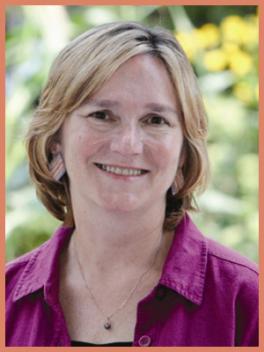
LUCY ELDERSVELD MURPHY was Professor of History at The Ohio State University at Newark. Her research focuses on intercultural, interracial, and gender relations on Midwestern American borderlands. Murphy taught courses on Native American, U.S. women’s, immigration, antebellum American, and U.S. western history. She left a great impact on the university in her more than 20 years here.
Her book, Great Lakes Creoles: A French-Indian Community on the Northern Borderlands, Prairie du Chien, 1750 – 1860, is a case study of a fur-trade town in transition (Cambridge University Press, 2014) and her book, A Gathering of Rivers: Indians, Métis, and Mining in the Western Great Lakes, 1737-1832 (University of Nebraska Press, 2000) examined a century of social and economic transformations in northern Illinois and southern Wisconsin.
Her research on women - such an underserved area of Native American history - is revelatory. With Rebecca Kugel, she edited Native Women's History in Eastern North American before 1900: A Guide to Research and Writing (University of Nebraska Press, 2007). She is co-editor with Wendy Hamand Venet of the essay collection Midwestern Women: Work, Community, and Leadership at the Crossroads (Indiana University Press, 1997).
Professor Murphy helped to create Ohio State's American Indian Studies Program and served on the AIS oversight committee; in addition she helped to create the Ohio State Newark Earthworks Center and is a member of its Faculty Oversight Committee. She continued work to protect the Newark Earthworks and fight for Native Americans’ access to the site through supporting its UNESCO World Heritage Site status, which it finally earned in 2023, becoming Ohio’s first UNESCO site and just the 25th in the United States.
She was awarded grants such as the National Endowment for the Humanities to conduct an amazing oral history project, “Discovering the Stories of Native Ohio,” on Ohio-based Native Americans and their lives. This project led to the production of the film, The Native American Indian Center of Central Ohio: So We Can Find Harmony (2010), as well as the Ohio Native Heritage Archive at the Ohio State Newark library.
She has received numerous awards, including The Ohio State University Distinguished Diversity Enhancement Award, The Ohio State University College of Humanities Diversity Enhancement Award, Ohio State Newark Robert A. Barnes Award for Exemplary Teaching, and The Committee on Institutional Cooperation American Indian Studies Faculty Fellowship, Newberry Library, Chicago, among others. ■
Written by Margaret Newell, College of Arts and Sciences Distinguished Professor and Amanda Budreau, Events Program Coordinator
Jane Hathaway
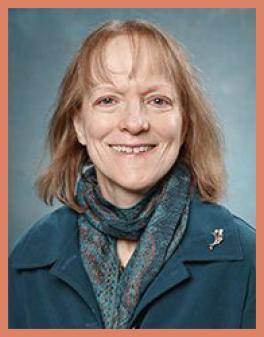
PROFESSOR JANE HATHAWAY retired from Ohio State after thirty years of service. She is an eminent historian of the early modern Ottoman Empire and the Middle East.
Hathaway is the author of five research monographs—The Politics of Households in Ottoman Egypt: The Rise of the Qazdaglis (1997); A Tale of Two Factions: Myth, Memory, and Identity in Ottoman Egypt and Yemen (2003); Beshir Agha: Chief Eunuch of the Ottoman Imperial Harem (2006); The Arab Lands under Ottoman Rule, 1516-1800 (2008; revised 2nd ed. 2020); and The Chief Eunuch of the Ottoman Harem: From African Slave to Power Broker (2018)— and editor of four books, many of which have been translated into Turkish and Arabic. Throughout her career, she has also published more than sixty journal articles and book chapters.
Hathaway was recognized for her scholarly achievements with the University’s Distinguished Scholar Award in 2018. The same year she was also named College of Arts and Sciences Distinguished Professor. In 2015, Hathaway received the Ohio Academy of History’s Distinguished Historian Award and in 2013-14 the Harlan Hatcher Distinguished Faculty Award.
Hathaway has diligently served the university, department, and profession in various capacities. She has been a member of the Board of Directors of the Middle East Studies Association (MESA), the Comité International d’Études Pre-Ottomanes et Ottomanes (CIEPO), and the Executive Committee of the International Association for Ottoman Social and Economic History (IAOSEH). She served as the president of the Turkish Studies Association between 2002 and 2004. As a dedicated mentor, Hathaway has advised a dozen students to completion and helped train many dozens more.
She is currently working on the understudied Ottoman era documents of the Cairo Geniza. ■
Written by Yiğit Akın, Associate Professor and Carter V. Findley Professor of Ottoman and Turkish History
Philip C. Brown
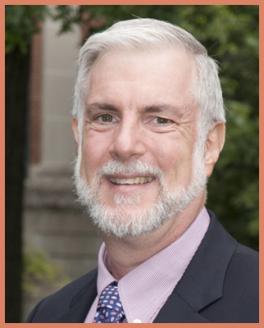
OVER THREE DECADES, Philip Brown boosted OSU’s stature in Japanese studies while also establishing his own global reputation as an innovative and productive scholar of early modern Japan. Additionally, between the 2012 retirement of late modern Japan historian, James Bartholomew, and his own retirement in 2020, Brown’s teaching and research moved into the late modern period including Japanese imperial history (colonial Manchuria and Taiwan).
Brown published two monographs, three edited books, and more than seventy articles and essays. He also garnered six dozen external grants and fellowships, including awards from several Fulbright programs, the National Science Foundation, the NEH, and Japan’s Research Institute for Humanity and Nature. He held postdoc or visiting scholar posts at Duke, the University of Michigan, Tokyo and Niigata Universities, and Academia Sinica (Taiwan).
Professor Brown’s central research interest was agriculture, water, and their impacts on people, local society, and the Japanese state. This interest expanded to environmental history, in which he won recent grants in collaboration with Nicholas Breyfogle.
Further, Brown counseled many MA and PhD students. OSU’s MA program in East Asian Studies, graduating students into government, the military, NGOs, and advanced academic programs, was his brainchild and, ultimately, his achievement. Here’s wishing Phil Brown as successful a retirement as he had a career while working with us. ■
Written by Christopher A. Reed, Associate Professor of Modern Chinese & East Asian History
John L. Brooke
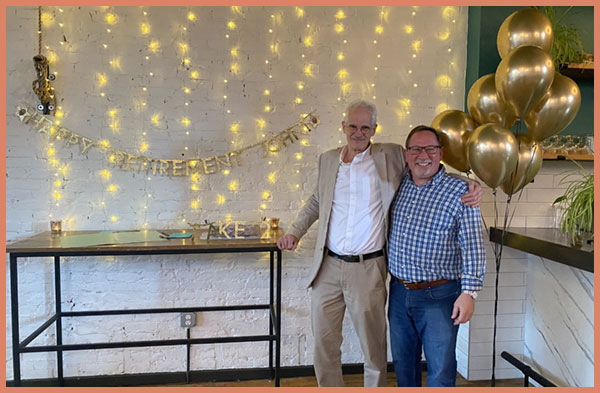
FORMER STUDENTS AND COLLEAGUES gathered for a conference at the Ohio Union on June 2 and 3, 2023 to wish a happy retirement to Professor John L. Brooke, Warner Woodring Chair in Early American History. Brooke, one of the leading early American historians of his generation, defined some of the dominant themes in the field during his forty-year career. He won Columbia University’s Bancroft Prize, widely considered the most prestigious academic book prize in American history, in 1995 for The Refiner’s Fire: The Making of Mormon Cosmology, 1644-1844 (Cambridge, 1994). His other major awards for work include the Organization of American Historian’s 1991 Merle Curti Award for Intellectual History for The Heart of the Commonwealth: Society and Political Culture in Worcester County, Massachusetts, 1713-1861 (Cambridge, 1989), the 1995 Society for Historians of the Early American Republic Best Book Prize for The Refiner’s Fire, the 2010 Dixon Ryan Fox Manuscript Prize from the New York State Historical Association and the 2010 Best Book Prize from the Society for Historians of the Early American Republic for Columbia Rising: Civil Life on the Upper Hudson from the Revolution to the Age of Jackson (University of North Carolina, 2010). He turned, in the past decade, to global environmental history in Climate Change and the Course of Global History: A Rough Journey (Cambridge, 2014) and the coming of the Civil War in “There is a North”: Fugitive Slaves, Political Crisis, and Cultural Transformation in the Coming of the Civil War (University of Massachusetts, 2019). His extensive work garnered the support of numerous prestigious fellowships, including those from the John Simon Guggenheim Memorial Foundation, widely seen as among the most prestigious fellowships in academia, twice from the National Endowment for the Humanities, the American Council of Learned Societies, Harvard University’s Charles Warren Center for Studies in American History, the American Antiquarian Society, and the Institute of Early American History and Culture at the College of William and Mary.
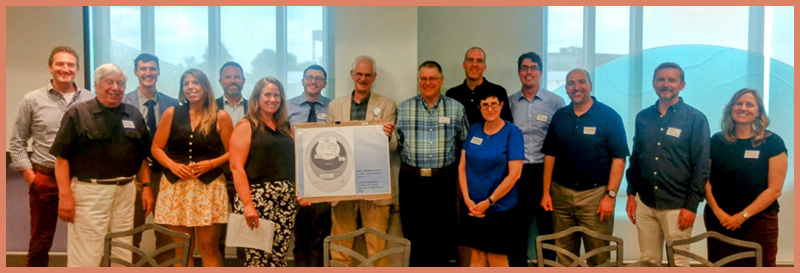
Brooke’s contributions to the study of history, particularly early American history, went well beyond his individual scholarship. Friends, students, and colleagues lauded his efforts as an incomparable mentor and transformative editor. He always remained a generous scholar, giving incalculably of his time and energy to help students flourish and to foster relationships. The conference held in his honor, therefore, served not only to recognize his contributions to the fields of American social, political, and global environmental history, but as a tribute to the personal impact he has had in the lives of those who have benefited from his generous tutelage. ■
Written by Kevin Vrevich, Visiting Assistant Professor of History, Wesleyan University and Emily Arendt, Associate Professor of History and Chair, Department of History, Montana State University Billings
